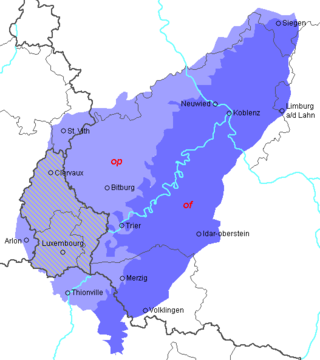Luxembourgish
Germanic language spoken in Luxembourg / From Wikipedia, the free encyclopedia
Dear Wikiwand AI, let's keep it short by simply answering these key questions:
Can you list the top facts and stats about Luxembourgish language?
Summarize this article for a 10 years old
Luxembourgish (/ˈlʌksəmbɜːrɡɪʃ/ LUK-səm-bur-gish; also Luxemburgish,[2] Luxembourgian,[3] Letzebu(e)rgesch;[4] Luxembourgish: Lëtzebuergesch [ˈlətsəbuəjəʃ] ⓘ) is a West Germanic language that is spoken mainly in Luxembourg. About 400,000 people speak Luxembourgish worldwide.[5]
| Luxembourgish | |
|---|---|
| Lëtzebuergesch | |
| Pronunciation | [ˈlətsəbuəjəʃ] ⓘ |
| Native to | Luxembourg; Saarland and north-west Rhineland-Palatinate, Germany; Arelerland and Saint-Vith district, Belgium; Moselle department, France |
| Region | Western Europe |
| Ethnicity | Luxembourgers |
Native speakers | 430,000 (2012)[1] |
| Official status | |
Official language in | |
Recognised minority language in | |
| Regulated by | Council for the Luxembourgish Language |
| Language codes | |
| ISO 639-1 | lb |
| ISO 639-2 | ltz |
| ISO 639-3 | ltz |
| Glottolog | luxe1243 |
| Linguasphere | 52-ACB-db |
 The area where Luxembourgish (pale indigo) and other dialects of Moselle Franconian (medium indigo) are spoken. The internal isogloss for words meaning "on, at", i.e. op and of, is also shown (Standard German: auf). | |
| This article contains IPA phonetic symbols. Without proper rendering support, you may see question marks, boxes, or other symbols instead of Unicode characters. For an introductory guide on IPA symbols, see Help:IPA. | |
As a standard form of the Moselle Franconian language, Luxembourgish has similarities with other varieties of High German and the wider group of West Germanic languages. The status of Luxembourgish as the national language of Luxembourg and the existence there of a regulatory body[6] have removed Luxembourgish, at least in part, from the domain of Standard German, its traditional Dachsprache. It is also related to the Transylvanian Saxon dialect spoken by the Transylvanian Saxons in Transylvania, contemporary central Romania.